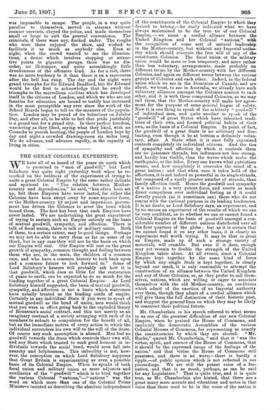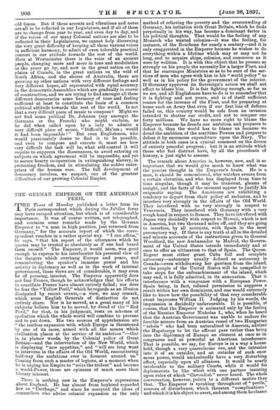THE GREAT COLONIAL EXPERIMENT.
WE have all of us heard of the peace on earth which is promised to "men of goodwill," but Lord Salisbury was quite right yesterday week when he re- marked on the boldness of the experiment of trying to unite a great Colonial Empire by the same rather delicate and spiritual tie. "The relation between Mother- country and dependencies," he said, "has often been set up, but these Empires have never lasted, for either the Colonies have been swept away by some superior force, or the Mother-country by unjust and imprudent govern- ment has driven the Colonies to sever the bond which bound them. The fact has been that such Empires have never lasted. We are undertaking the great experiment of trying to sustain such an Empire entirely on the basis of mutual goodwill, sympathy, and. affection. There is talk of fiscal union, there is talk of military union. Both of them, to a certain extent, may be good things. Perhaps we may not be able to carry them as far as some of us think, but in any case they will not be the basis on which our Empire will rest. Our Empire will rest on the great growth of sympathy, common thought and feeling between those who are, in the main, the children of a common race, and who have a common history to look back upon and a common future to look forward to." Some of Lord. Salisbury's hearers will probably ask how it is that goodwill, which does so little for the restoration of peace to earth, can be expected. to do so much for the binding together of a great Colonial Empire. As Lord Salisbury himself suggested, the basis of mutual goodwill, sympathy, and affection is not a basis which statesmen have usually treated. as the binding cords of empire. Certainly in any individual State if you were to speak of mutual goodwill as the bond of union, men would think that you were in effect going back to the exploded theory of Rousseau's social contract, and. this not merely as an imaginary contract of a society arranging with each of its members to submit to compulsion for the benefit of all, but as the immediate motive of every action in which the individual surrenders his own will to the will of the State. Of course any such assumption is absurd. Men feel no goodwill towards the State which controls their own will, and any State which trusted to such good humour in in- dividuals towards the social bond, would soon fall into anarchy and helplessness. This imbecility is not, how- ever, the conception on which Lord. Salisbury supposes that Great Britain is experimenting as even a possible basis of its Colonial Empire. When he speaks of both fiscal union and. military union as mere adjuncts and auxiliaries of the " goodwill " which is to bind together the various Colonial "nations,"—" nations" was the word on which more than one of the Colonial Prime Minigtsma insisted as describing the absolute independence of the constituents of the Colonial Empire to which they desired to belong,—he really indicated what we have always maintained to be the true tie of our Colonial Empire, — we mean a cordial alliance between the United Kingdom and her Colonial "nations," with the recognition of some sort of natural leadership in the Mother-country, but without any Imperial autho- rity which should overrule the free will of any of the constituent Colonies. The fiscal union or the military union would be more or less temporary, and more rather than less voluntary, arrangements, made probably on different terms by the Mother-country with her different Colonies, and again on different terms between the various groups of Colonies and each other. Indeed, in the federal union which we see in the Dominion of Canada, and are about, we trust, to see in Australia, we already have such voluntary alliances amongst the Colonies nearest to each other, and it is with these compound Colonies, as we may call them, that the Mother-country will make her agree- ment for the purpose of some general league of safety. Now it is one thing to speak of the arbitrary " goodwill " of individual men, and quite another to speak of the " goodwill " of great States which have inherited tradi- tions of their own, and formed political habits of their own, as the basis of a Colonial Empire. In point of fact, the goodwill of a great State is no arbitrary and fluc- tuating, even though it be at bottom a definitely volun- tary, affair. A State when it is once fully organised. controls completely its individual citizens. And the ties of sympathy and affection by which it controls them are no gossamer threads, but influences not less strong, and hardly less visible, than the waves which make the earthquake, or the tides. Every one knows what patriotism means, and how completely it overrules the mind of a great nation ; and that when once it takes hold of the affections, it is not indeed so powerful in its single strands, but composed. of a vastly greater number of strands, than family affection itself. Hence the goodwill and sympathy of a nation is a very potent force, and exerts as much direct compulsion over individual feeling as if it could. directly punish (as it sometimes can) those who do not concur with the national purpose in its leading tendencies. It is no doubt, as Lord Salisbury says, an experiment, and by no means an experiment of the results of which we can be very confident, as to whether we can or cannot found. a Colonial Empire on the basis of goodwill amongst a con- siderable number of different nations distributed over all the four quarters of the globe ; but as it is certain that we cannot found it on any other basis, it is clearly an experiment well worth trying. It may be that so great an Empire, made up of such a strange variety of materials, will crumble. But even if it does, enough may yet remain to double the strength of the United Kingdom taken alone. At all events, since a Colonial Empire kept together by the same kind of force by which any single State is kept together, is clearly beyond our reach, it is only reasonable to attempt the construction of an alliance between the United Kingdom and any of those Colonies, or, as they prefer to call them- selves, nations, which are willing or eager to associate themselves with the old Mother-country, on conditions which admit of the exertion of no Imperial authority over them, though they admit of a cordial alliance which will give them the full distinction of their historic past, and suggest the general lines on which they may be likely to construct their political future.
Mr. Chamberlain in his speech referred to what seems to us one of the greatest difficulties of our new Colonial Empire, when he praised the House of Commons, and implicitly the democratic Assemblies of the various Colonial Houses of Commons, for representing so exactly the constituencies by which they are elected. "Mr. Burke," quoted Mr. Chamberlain, "said that it was the virtue, spirit, and essence of the House of Commons, that it should be the expressed image of the feelings of the nation,' and that virtue the House of Commons still possesses, and there is no wave,—there is hardly a ripple,—of public opinion which is not reflected in out proceedings. We are still the potent voice of a free . nation, and. that is as much, perhaps, as can be said for any Legislature." That is quite true, and it is quite true, as Mr. Chamberlain also hinted, that there are a great many more accents and vibrations and. notes in that voice than there used to be in the voice of the nation in .old times. But if these accents and vibrations and notes are all to be reflected in our Legislature, and if all of them are to change from year to year, and even day to day, and if the voices of our many Colonial nations are also to be reflected in their Legislatures, we cannot help discerning the very great difficulty of keeping all these various voices in sufficient harmony, to admit of even tolerable practical concert in our attitude towards the rest of the world. Here at Westminster there is the voice of an ancient people, changing more and more in tone and modulation as the years go by, and now in the great nation on the plains of Canada, in the great nations on the veld of South Africa, and the shores of Australia, there are growing up other nations with very different feelings and very different hopes, all represented with equal accuracy in the democratic Assemblies which are gradually in course of construction, and we are trying to find amongst all these different democracies some harmony of tone and feeling sufficient at least to constitute the basis of a common political attitude towards the rest of the world. Is not that a very difficult piece of music to compose? Might we not find some political Dr. Johnson (say amongst the Germans or the French) who might exclaim, as he did when called upon by a lady to admire a very difficult piece of music, "Difficult, Ma'am ; would it had been impossible ! " But even Englishmen, who would passionately desire to find it to be possible, and even to compose and execute it, must see how very difficult the task will be, what self-control it will require to suppress the dissonances, to avoid entering on subjects on which agreement will be impossible, and yet to secure hearty co-operation in extinguishing slavery, in protecting freedom, and in stimulating the nobler enter- prises of the human race. The full development of democracy involves, we suspect, one of the greatest difficulties of our growing Colonial Empire.



















































 Previous page
Previous page